On May 8 (Japan time), the prizegiving ceremony for the "United Japanese Researchers Around the World Outstanding Research Paper Award" (UJA Outstanding Research Paper Award) was held. This award recognizes Japanese researchers that are active overseas and who have built relationships of trust that contribute to their significant research achievements. It is distinctive in how it not only acknowledges excellence in research, but also highlights the ability to deliver results through collaboration with other researchers overseas. The award was established in cooperation with Dr. Ei-ichi Negishi, who was a Distinguished Professor at Purdue University in Indiana and recipient of the 2010 Nobel Prize in Chemistry. This year's prizegiving ceremony celebrated the life of Dr. Negishi, who passed away in June last year. It provided insights into the passion of young researchers who have headed overseas in search of new challenges and achievements.
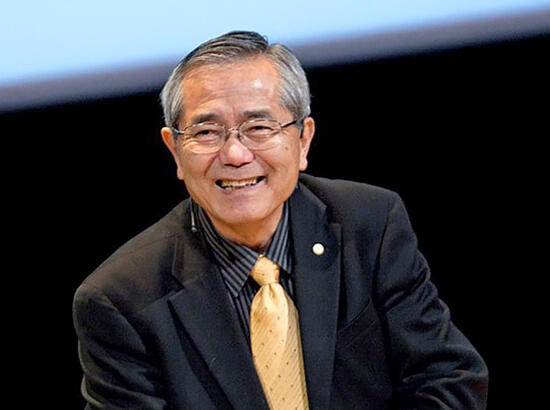
(Provided by Purdue University)
A growing award attracting 61 submissions this year
The UJA Outstanding Research Paper Award originated with the IT-IJC Outstanding Research Paper Award, for which Dr. Negishi chaired the selection committee, and preparations began in 2014. Including the above award, this year marks the seventh time the prize has been presented. The award is organized by United Japanese Researchers Around the World (UJA), an incorporated association that links an overseas Japanese research community of around 50 organizations and 6,000 people. It functions as a platform for mutual assistance in career building, provision of information and support for people considering studying abroad, and of information exchange and collaboration with educational and government scientific and technology organizations. The Cheiron Initiative, of which the UJA is a joint sponsor, is an NPO that aims to connect researchers and their families as well as science and society. Assistance is also provided by the likes of the Japan Science and Technology Agency (JST).
Its advisors include well-known scientists, such as Yoshinori Ohsumi, who received the 2016 Nobel Prize in Physiology or Medicine and who has since last year been Honorary Professor at the Tokyo Institute of Technology, as well as Dr. Reiko Toyama, who is Program Director at the U.S. National Institutes of Health (NIH). The scope of the award has been growing year by year. In 2022 it attracted 61 submissions, particularly from the U.S. East Coast, Midwest, and West Coast, as well as from Europe and Canada. After a strict and impartial screening process involving 22 managing members and more than 30 judges, a total of 20 applicants across 14 fields received awards.
Dr. Tatsuyoshi Kono, a Research Assistant Professor at the Indiana University School of Medicine and one of the founders of the award, is passionate about his role in its operation. He also perceives a strong response from researchers. "More and more people have become aware of this award, and this year's submissions were at a high level. I would like to offer my congratulations to everyone who submitted for embracing significant new challenges, including those who were not ultimately recognized. It's important that this award encourages more people to study abroad, that researchers connect with each other, and that the valuable research findings that each and every one of the researchers deliver lead to career advancement and social implementation. In fact, many recipients have subsequently contacted us to say they have been appointed to the positions they were aiming for, which is wonderful news indeed. One of the strengths of this award is how it enables the free sharing of know-how that leads to success. It takes a lot of effort to run this award, but I have met many amazing people and personally gained so much from it."
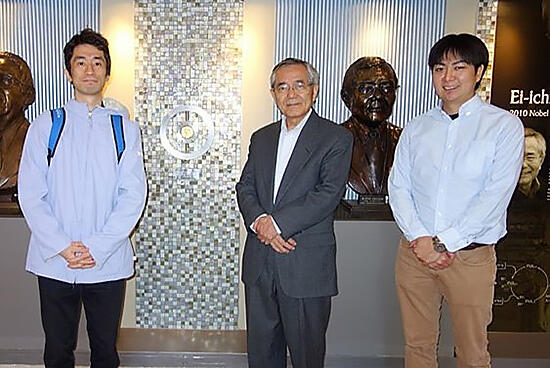
Dr. Tatsuyoshi Kono is on the right (photo provided by Dr. Kono)
Embracing the challenges of new environments leads to success
Two distinctive features of the award are the requirements for application and the selection criteria. Articles suitable for submission are (1) papers that the applicant has written as the lead author (joint lead authors are permitted) showing the results of the research the applicant carried out at the facilities they studied abroad at, and (2) peer-reviewed academic articles written in English. Moving outside Japan and delivering results at a research facility overseas are requirements of the award.
On top of this, the selection criteria include (1) the paper having great significance in advancing the applicant's career as a researcher, (2) the content making a large contribution to the research field, (3) the paper having high academic value, (4) the applicant having high future potential, and (5) the research attracting scientific interest thanks to having value beyond the specialist field concerned. Papers having great significance in an author's career need to be praised from perspectives external to the field as well.
Being accepted by a research facility overseas and the people working there, as well as delivering results there, demands making great efforts to build relationships of trust across cultures. From visa application to the details of setting up a new life, a wide range of procedures and hassle are involved. Making that patient, unstinting effort requires a belief that making a career move to a new environment will ultimately lead to excellent results. The members of UJA place so much importance on this award because they are sharing the value of this belief through practical experience. They can also be called pioneers building new values for society and spreading the word about them.
Not minding long hours for the value you believe in
All of the award's 22 managing members and 44 judges are researchers currently active and working either in Japan or overseas. Despite fighting to survive amid fierce competition, they give up their time to manage all stages of the process from calling for applications to making the awards, as well as peer reviewing the submitted papers. Even though they have so many pressing demands on their time, why do they never say that they cannot do it? The only possible conclusion is that they hold certain values and want to spread them throughout society. Those are the values of self-supporting endeavor. This approach is evident in researchers who take the plunge by moving to a facility overseas, building trust, and delivering results there.
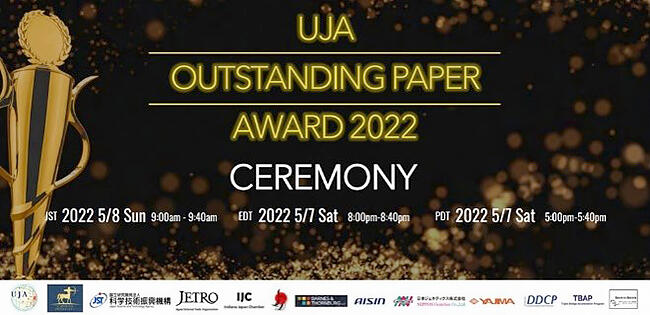
Their approach to research, supported by the collaboration of a great many people, provides insights into how passionately and energetically these overseas researchers work. The award has also created many specific impacts, such as receiving the award catalyzing discussions about employment, beginning joint research with the people who shared a table at the award ceremony, and receiving the award helping to secure a U.S. green card.
Ms. Moe Ishihara, a PhD candidate at UCLA who worked as the award ceremony management team leader, recalled that "I personally spent a reasonably long period engaged in research overseas, which would not have been possible without the support of the people around me," in doing so also expressing optimism about the future of the award. "I'm very proud to collaborate with many talented researchers to recognize the achievements of our colleagues putting in a lot of effort overseas and build meaningful connections by doing so. Initiatives and networks such as the UJA Outstanding Research Paper Award provide further encouragement and likely slightly lower the many barriers to remaining overseas for an extended period. From next year, we aim to hold a more comprehensive and impressive award ceremony. I'd be especially happy if many female researchers and younger researchers such as PhD students applied and got involved in running the awards."
To the managing members and judges, Dr. Negishi was always an exemplary colleague. As a Nobel Prize recipient, he was constantly in high demand, but until 2017 he read and evaluated every one of the papers submitted each year. Even when he was away on business trips, papers with his handwritten assessments would arrive at the awards secretariat by fax. He harbored a sense of danger about the state of science in Japan, and until his passing kept a close eye on the activities of young Japanese researchers overseas, delighting in their progress as if it were his own. His smile lives on with Dr. Kono.
The Cheiron Initiative, of which the UJA is a joint sponsor, is worthy of note in how it aims to support not only researchers, but also their families. The initiative wishes to spread the recognition that many research activities are made possible only through support from family members.
"Excellence itself is the ultimate reward"
Dr. Negishi left us a simple message: "That the pursuit of excellence is critical, and excellence itself is the ultimate reward." At this year's award ceremony, his daughter Charlotte made the following congratulatory address.
"On behalf of my father, I would like to congratulate all of you! What an accomplished and intelligent group of people you are. I'd like to share a quote from part of my father's Nobel Banquet speech. He said: 'The final reward for any researcher is to see his or her lifetime of work extend beyond academia and laboratories, into the mainstream of our global society where it can breathe hope into the world. Our pursuit in research must not be for rewards. Our pursuit in whatever we do must always be for excellence, and if we accomplish excellence, it is its own reward and recognition will follow.' I believe his involvement with organizations such as yours and his passion to nurture future generations is evident in his speech. As he says, 'into the mainstream of our global society where it can breathe hope into the world.' You are our hope, you are our future, and my father's hope for each of you is that all of you can be motivated by his philosophy, and make pursuing excellence your first priority. Then, as he says, great things will follow! I wish all of you the best!" ー Charlotte Negishi East
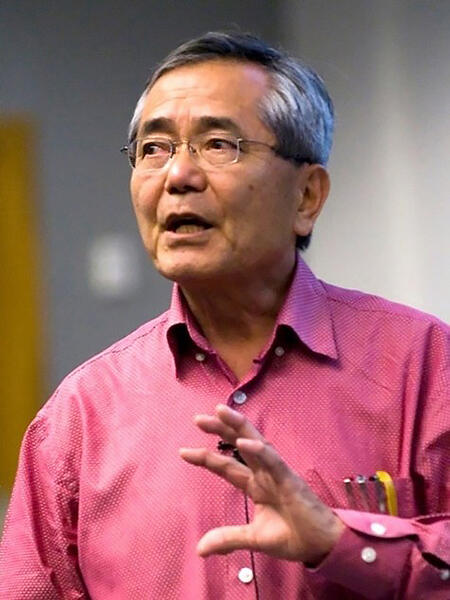
(Provided by Purdue University)
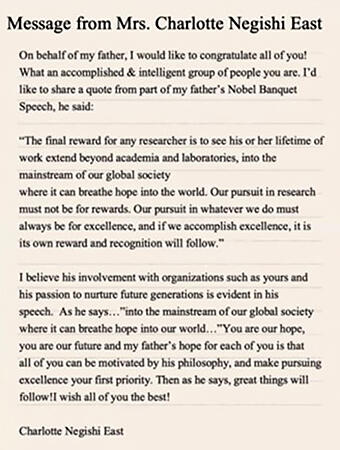
(Provided by UJA)
Heading off overseas and creating new value and environments through your own abilities. The excellence sought and finally accomplished is the reward for people who have devoted their lives to research. The attendees at the award ceremony reflected on and absorbed what this means for their pride as scientists. The UJA Outstanding Research Paper Award and the spirit in which it is presented will continue the legacy of Dr. Negishi into the future.
SHIMADA Kazuyoshi, Director of JST Washington D.C. Office
Original article was provided by the Science Portal and has been translated by Science Japan.




